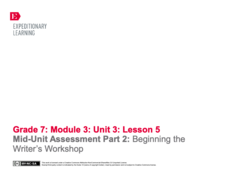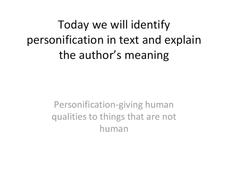Curated OER
Lesson: Mad Lib Leigh!
A fun and quirky painting is analyzed for details in an art/literacy lesson plan. Youngsters look for colors, shadows, and details and then describe them using vivid language. They use the words from discussion to complete a fun Mad...
Read Works
The Language of Setting
Descriptive language can be used to create a vivid and imaginative setting. Create the chart suggested in this plan to track the descriptive language found in The Wizard of Oz by L. Frank Baum. The class discusses the land beyond...
Poetry4kids
Personification Poetry Lesson Plan
Scholars take part in two exercises to boost their knowledge of personification. After reading a detailed description and excerpts from famous poems, writers list action verbs and objects then combine words to create a humorous...
Curated OER
Strong Descriptive Writing: James and the Giant Peach
Support your writers! Clear procedures and appropriate support make this a superb resource for elementary writing instruction. Ready your class to compose original descriptive paragraphs inspired by the episode in Roald Dahl's James and...
Curated OER
Writing with Vivid Verbs
Students find vivid verbs in literature and use them in their own writing. In this vivid verbs lesson, students use a 'Thinking Thesaurus' of major verbs to study common verbs. Students then practice rewriting sentences using vivid...
Curated OER
Grab Your Reader: Great Leads
Get your readers' attention with this Six Traits of Writing lesson plan. First, young writers draft ideas in an organized manner utilizing words, sentences, and multiple paragraphs. They also use voice to fit the purpose and audience and...
Curated OER
Conventions: Strong Verbs
Fifth graders practice using strong verbs. In this conventions lesson, 5th graders brainstorm words to complete sentences and list lively and exciting verbs. Students act out meanings of certain words. Students come up with new ways to...
Curated OER
Word Choice: Descriptive Verbs
In this word choice worksheet, students will read a 5 paragraph essay about an igloo hotel. Then students will replace 10 verbs with more descriptive verbs. Next, students will use strong verbs from a word bank to complete 14 sentences...
Curated OER
Using Imagery
Show, don't tell! Pairs work together to change a list of telling sentences into showing sentences using picture words that create vivid pictures in the readers’ minds.
Curated OER
Pride and Prejudice: List-Group-Label
What words would you use to describe Mr. Darcy? What about Elizabeth? Use vivid vocabulary to create lists of adjectives to describe the characters of Jane Austen's Pride and Prejudice. After kids come up with their own lists of words,...
Roald Dahl
Charlie and the Chocolate Factory
You can't read Roald Dahl's Charlie and the Chocolate Factory without craving the rich treats described in Dahl's vivid prose. Young writers try their hands at sensory language with a lesson plan that prompts them to write about their...
Curated OER
Lesson: Paint Inspiring Words
The painting Three Young Girls circa 1620, was believed to be painted after the death of the subjects' mother. Art enthusiasts analyze the image details to determine if they come to the same conclusion. They then use the sensory details...
Curated OER
Using Dreams in Writing
C.S. Lewis’s That Hideous Strength provides the model for using dreams in narrative writing. After a discussion of the purpose of dreams in Lewis’s tale, class members craft a story in which their dreams play an essential role.
Curated OER
Lesson: Beyond First Impressions
Just like the colors and techniques used to create a vivid image, learners will use exceptional language to create vivid stories. They examine the techniques used to tell a visual story in the painting, Road to Santa Fe. They then use...
Curated OER
What Is Your Favorite Place?
Good writing can come from personal places. Budding online authors read an excerpt from a narrative-style newspaper article and then respond to several related writing prompts. They compose blog responses that use vivid imagery to...
Curated OER
Celebrating Halloween through Language and Literature
Use the theme of Halloween to spice up campfire stories, journal writing, and presentations in your classroom.
EngageNY
Mid-Unit Assessment Part 2: Beginning the Writer’s Workshop
Writers learn about using sensory details as they revise bland sentences with more vivid language. Next, they begin writing the first drafts of their children's books, completing storyboards to effectively plan their writing.
Curated OER
Writing with Strong Verbs
Students use strong verbs in their writing. In this verbs in writing instructional activity, students locate the verbs in their writing, then identify the verbs that are weak and make revisions.
Curated OER
Narrative Writing
Fifth graders study narrative writing. In this language arts lesson, 5th graders review how an author uses vivid verbs, imagery, and adjectives to capture reader's attention. Students explore literary devices of foreshadowing, flashback...
National Endowment for the Humanities
Vengeful Verbs in Shakespeare’s “Hamlet”
It's time for pupils to read, examine, and contemplate literature to explore the difference between vivid and generic verbs. Pupils distinguish between the two types of verbs as they read the ghost scene from Shakespeare's Hamlet. They...
Curated OER
Setting Worksheet
Set your class up for success with writing descriptive settings with these two graphic organizers. On the first page, writers note specifc details about their chosen setting and comment on how each character views the setting. The second...
Curated OER
Personification
Introduce your young scholars to personification. The literary device is clearly defined and illustrated with clever examples. Opportunities for guided and independent practice using poems by Emily Dickinson and Langston Hughes are also...
Curated OER
Fear Factor Fun
Students develop "Fear Factor" stunts using descriptive language. In this writing lesson, students watch clips from the show "Fear Factor" and develop their own stunts. Students write and explain the stunts in vivid language.
Macmillan Education
Understanding Poetry
William Wordsworth's "Daffodils" provides young poets with an opportunity to examine how a poet can use powerful images and poetic devices to create vivid pictures in the minds of readers.

























